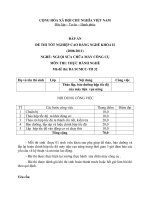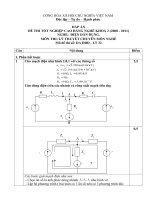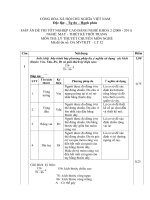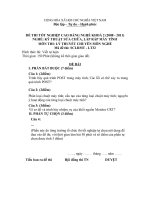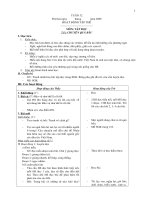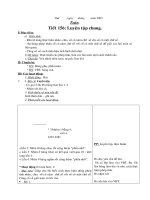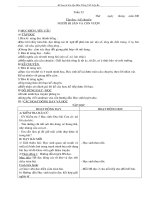PASSAGE 32
Bạn đang xem bản rút gọn của tài liệu. Xem và tải ngay bản đầy đủ của tài liệu tại đây (53.12 KB, 4 trang )
PASSAGE 32
Some cities are located by chance. A wagon breaks down, the driver spends some time in repairs, finds
that he is in a congenial spot, and settles down. Later another person builds a house near his, and later
someone adds an inn. Someone else starts selling farm produce there. Soon there is a little market, which
grows to a town, and later to a city.
Other places were destined by nature to become cities. London, for example, is on what is called the head
of navigation - the point where it becomes too difficult for ocean-going ships to continue upriver, and
must transfer their cargoes. As with London, the head of navigation is also the point where the river can
be conveniently bridged. In fact, the location of a bridge is often the reason for the birth of a town - as
Cambridge or Weybridge in England show. Again, a good harbour will generally lead to a city growing up
about it. New York and San Francisco began life as ports, as did Cape Town in south Africa.
Some places were created mainly for military purposes, such as Milan, and the host of English cities
finishing with - cester, which is derived from castra which means camp in Latin. Chester itself, created
to guard the Welsh border is a very good example. Other such military bases are Manchester, Doncaster,
and of course, Newcastle.
A few cites are not created by accident, but by intention. This was the case with Milton Keynes in
England, but the most famous examples of such cities are capitals. Brasilia, Canberra and Washington are
capitals created in modern times, but even their greatest admirers will admit that they lack a certain
character. It is no co-incidence that there are famous pop songs about New York, ("New York, New
York") Chicago ("My kind of Town") San Francisco (Going to San Francisco") and many other US cities,
but none about the nation's capital. On the other hand any Londoner can give you at least three songs
about the place.
Question 1. This reading passage is mainly about _________.
A. why capital cities are created
B. places where cities might begin
C. famous cities and urban life
D. why some city sites are chosen
Question 2. The word “congenial” in the first paragraph probably means __________.
A. pleasing
B. noisy
C. related
D. favorable
Question 3. According to the passage, London owes its origin to________.
A. a river
B. a bridge
C. an army camp
D. a countryside ship
Question 4. The passage suggests that a large harbor _________.
A. may lead to the development of a big city
B. is important for import/ export
C. is a place where wars start
D. is always located in capital cities
Question 5. The passage suggests that English cities of military origin_________.
A. can be found from their locations
B. can be found from their names
C. are more common than other cities
D. always end with end with -cester
Question 6. It can be inferred from the passage that the word “Chester” has _________ roots.
A. Italian
B. Roman
C. Latin
D. Latin America
Question 7. Which of the following is NOT given as a reason for a new city?
A. random events
B. wars
C. trade
D. politics
Question 8. There are no songs about Washington because __________.
A. it is the national capital
B. it is too modern
Page 1
C. the city has little character
D. songwriters don't like politics
ĐÁP ÁN
1-D
2-D
3-A
6-C
7-D
8-C
4-A
5-B
LỜI GIẢI CHI TIẾT
Question 1:
Đoạn văn đọc này chủ yếu là về_____
A. tại sao thành phố thủ đô được tạo ra
B. những nơi mà các thành phố có thể bắt đầu
C. thành phố nổi tiếng và đời sống đô thị
D. tại sao một số được chọn
=> Dẫn chứng: Một số thành phố được tạo nên bởi tình cờ. Một toa xe bị hỏng, người lái xe dành thời
gian để sửa chữa, cho thấy rằng anh ta đang ở một vị trí thích hợp, và sống ổn định ở đó. Some cities are
located by chance. A wagon breaks down, the driver spends some time in repairs, finds that he is in a
congenial spot, and settles down.. Later another person builds a house near his, and later someone adds an
inn. Someone else starts selling farm produce there. Soon there is a little market, which grows to a town,
and later to a city. Other places were destined by nature to become cities.
Dịch: Sau đó, một người khác xây một ngơi nhà gần nhà anh ta, và sau đó có người thêm một nhà trọ.
Một số người khác bắt đầu bán nông sản ở đó. Chẳng mấy chốc, có một khu chợ nhỏ, phát triển thành
một thị trấn, và sau đó là một thành phố. Những nơi khác đã được thiên nhiên định sẵn để trở thành thành
phố.
Question 2:
Từ "congenial" trong đoạn đầu tiên có lẽ có nghĩa là __________.
A. vừa lịng
B. ồn ào
C. liên quan
D. thuận lợi
=> Dẫn chứng: Some cities are located by chance. A wagon breaks down, the driver spends some time in
repairs, finds that he is in a congenial spot, and settles down.
Dịch: Một số thành phố được tạo nên bởi tình cờ. Một toa xe bị hỏng, người lái xe dành thời gian để sửa
chữa, cho thấy rằng anh ta đang ở một vị trí thích hợp, và sống ổn định ở đó. = favorable (thuận lợi)
Question 3:
Theo đoạn văn, London có nguồn gốc từ_____.
A. một dịng sơng
B. một cây cầu
C. một trại quân đội
D. một con tàu nông thôn
=> Dẫn chứng; London, for example, is on what is called the head of navigation - the point where it
becomes too difficult for ocean-going ships to continue upriver, and must transfer their cargoes.
Dịch: London, chẳng hạn, nằm trên cái được gọi là đầu tàu hàng hải – nơi mà rất khó để các tàu đi biển
có thể tiếp tục ngược dịng và bắt buộc phải chuyển hàng hóa của họ vào đó.
Question 4:
Page 2
Đoạn văn gợi ý rằng một bến cảng lớn _________.
A. có thể dẫn đến sự phát triển của một thành phố lớn
B. quan trọng đối với xuất nhập khẩu
C. là nơi bắt đầu chiến tranh
D. luôn nằm ở thành phố thủ đô
=> Dẫn chứng: Again, a good harbour will generally lead to a city growing up about it. New York and
San Francisco began life as ports, as did Cape Town in south Africa.
Dịch: Một lần nữa, một bến cảng tốt thường sẽ dẫn đến một thành phố lớn lên ở nó. New York và San
Francisco đều bắt đầu cuộc sống như những cảng, và cũng giống như Cape Town ở Nam Phi.
Question 5:
Đoạn văn gợi ý rằng các thành phố của Anh có nguồn gốc quân sự______.
A. có thể được tìm thấy từ vị trí của họ
B. có thể được tìm thấy từ tên của họ
C. phổ biến hơn các thành phố khác
D. luôn luôn kết thúc với kết thúc bằng –cester
=> Dẫn chứng: Some places were created mainly for military purposes, such as Milan, and the host of
English cities finishing with - cester, which is derived from castra which means camp in Latin. Chester
itself, created to guard the Welsh border is a very good example. Other such military bases are
Manchester, Doncaster, and of course, Newcastle.
Dịch: Một số nơi được tạo ra chủ yếu cho mục đích quân sự, chẳng hạn như Milan, và một loạt các thành
phố của Anh kết thúc với - cester, có nguồn gốc từ castra có nghĩa là trại theo tiếng Latin. Bản thân
Chester, được tạo ra để bảo vệ biên giới xứ Wales là một ví dụ rất hay. Các căn cứ quân sự khác như vậy
là Manchester, Doncaster, và tất nhiên, Newcastle.
Question 6:
Có thể suy ra từ đoạn văn “Chester” có nguồn gốc.
A. Ý
B. La Mã
C. La tinh
D. Mỹ Latinh
Dẫn chứng: Some places were created mainly for military purposes, such as Milan, and the host of
English cities finishing with - cester, which is derived from castra which means camp in Latin. Chester
itself, created to guard the Welsh border is a very good example.
Dich: Một số nơi được tạo ra chủ yếu cho mục đích quân sự, chẳng hạn như Milan, và một loạt các thành
phố của Anh kết thúc với - cester, có nguồn gốc từ castra có nghĩa là trại theo tiếng Latin. Bản thân
Chester, được tạo ra để bảo vệ biên giới xứ Wales là một ví dụ rất hay
Question 7:
Điều nào sau đây KHÔNG được đưa ra như một lý do cho một thành phố mới?
A. sự kiện ngẫu nhiên B. chiến tranh C. thương mại D. chính trị
=> Dẫn chứng: (A) Some cities are located by chance.
(B) Some places were created mainly for military purposes
(C) London, for example, is on what is called the head of navigation - the point where it becomes too
difficult for ocean-going ships to continue upriver, and must transfer their cargoes.
Dịch: (A) Một số thành phố được tạo nên ngẫu nhiên.
Page 3
(B) Một số nơi được tạo ra chủ yếu cho mục đích quân sự
(C) London, chẳng hạn, nằm trên cái được gọi là đầu tàu hàng hải – nơi mà rất khó để các tàu đi biển có
thể tiếp tục ngược dịng và bắt buộc phải chuyển hàng hóa của họ vào đó.
Question 8:
Khơng có bài hát nào về Washington vì __________.
A. đó là thủ đơ quốc gia
B. nó q hiện đại
C. thành phố có ít nhân vật
D. nhạc sĩ khơng thích chính trị.
=> Dẫn chứng: Brasilia, Canberra and Washington are capitals created in modern times, but even their
greatest admirers will admit that they lack a certain character.
Dịch: Brasíc, Canberra và Washington là thủ đô được tạo ra trong thời hiện đại, nhưng ngay cả những
người ngưỡng mộ nhất của chúng cũng sẽ thừa nhận rằng chúng thiếu một nhân vật nhất định.
Page 4
